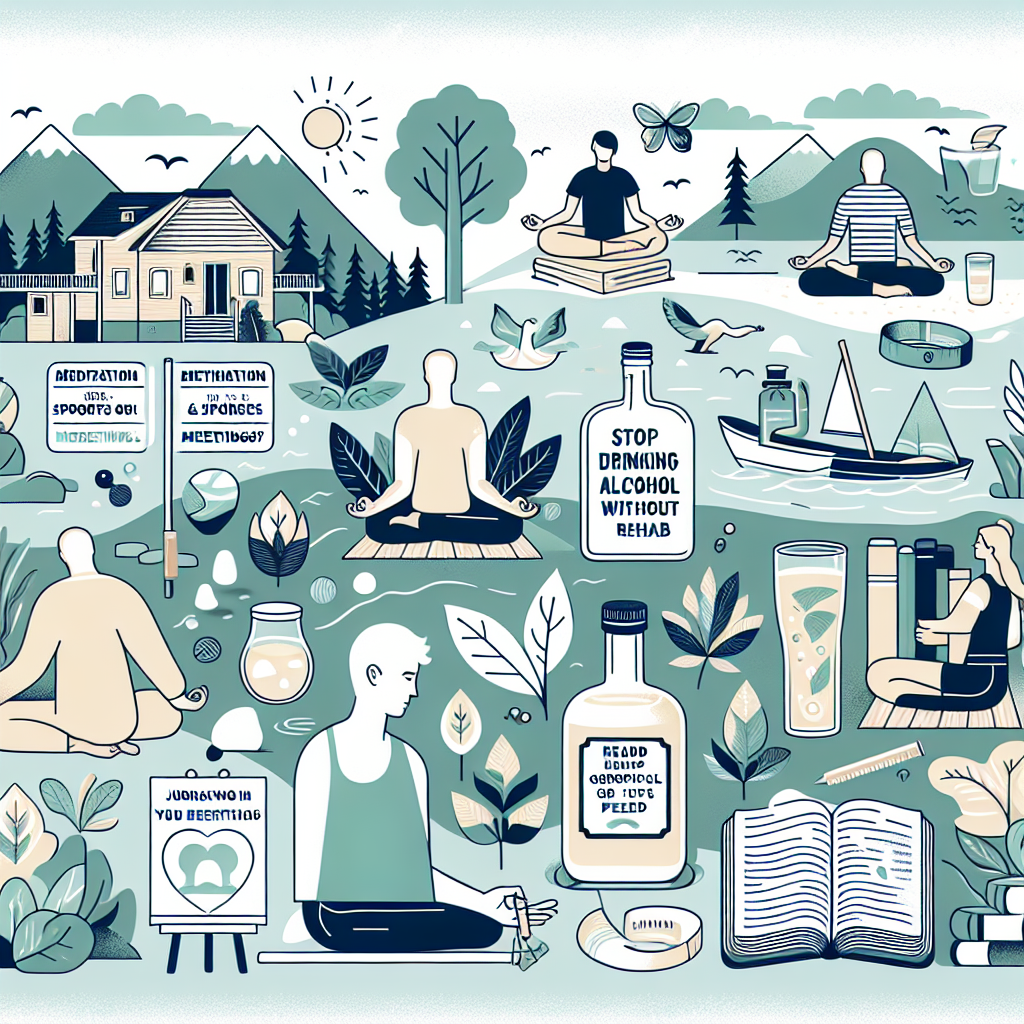-
Table of Contents

“Empower Your Sobriety: Break Free from Alcohol Without Rehab”
Introduction
Stopping drinking without rehab involves a combination of self-awareness, commitment, and support. It begins with acknowledging the problem and setting clear, achievable goals. Educating oneself about the effects of alcohol and the benefits of sobriety can strengthen resolve. Developing a structured plan that includes avoiding triggers, finding healthy alternatives, and building a support network of friends, family, or support groups is crucial. Additionally, adopting healthy lifestyle changes such as regular exercise, balanced nutrition, and stress management techniques can aid in the process. Seeking professional guidance from a therapist or counselor can also provide valuable tools and strategies for maintaining sobriety.
Practical Steps to Quit Drinking on Your Own
Quitting drinking without the aid of a rehab facility is a challenging yet achievable goal. It requires a combination of self-awareness, determination, and practical strategies. The first step in this journey is acknowledging the problem. Recognizing that alcohol has a negative impact on your life is crucial. This self-awareness serves as the foundation for all subsequent actions. Once you have acknowledged the issue, setting clear and realistic goals is essential. Instead of aiming to quit cold turkey, consider setting incremental milestones. For instance, start by reducing your alcohol intake gradually. This approach can make the process less overwhelming and more manageable.
In addition to setting goals, creating a supportive environment is vital. Surround yourself with people who understand your decision and are willing to support you. This might involve having open conversations with friends and family about your intentions. Their encouragement can provide the emotional backing you need during difficult times. Moreover, avoiding situations where you are likely to drink can significantly reduce temptation. If certain social settings or events trigger your drinking habits, it might be wise to avoid them initially.
Another practical step is to find healthy alternatives to drinking. Engaging in activities that you enjoy can serve as a distraction and reduce the urge to drink. Exercise, for example, is an excellent way to release endorphins and improve your mood. Hobbies such as reading, painting, or gardening can also provide a sense of fulfillment and keep your mind occupied. Additionally, practicing mindfulness and stress-relief techniques like meditation or yoga can help you manage the emotional triggers that often lead to drinking.
Keeping a journal can be an effective tool in your journey to quit drinking. Documenting your thoughts, feelings, and progress can provide valuable insights into your behavior patterns. It allows you to reflect on your achievements and identify areas that need improvement. Furthermore, tracking your progress can serve as a motivational tool, reminding you of how far you have come and reinforcing your commitment to change.
Seeking professional help, even if you are not attending rehab, can also be beneficial. Therapists and counselors specializing in addiction can offer guidance and support tailored to your specific needs. They can help you develop coping strategies and provide a safe space to discuss your challenges. Additionally, support groups such as Alcoholics Anonymous (AA) offer a community of individuals who share similar experiences. These groups can provide a sense of belonging and accountability, which can be incredibly motivating.
It is also important to take care of your physical health during this process. Eating a balanced diet, staying hydrated, and getting enough sleep can improve your overall well-being and make it easier to cope with the challenges of quitting alcohol. Supplements such as vitamins and minerals can also support your body’s recovery from the effects of alcohol.
Lastly, be patient with yourself. Quitting drinking is a significant life change and it is normal to experience setbacks. Instead of viewing these setbacks as failures, consider them as learning opportunities. Each challenge you overcome makes you stronger and more resilient. Celebrate your successes, no matter how small they may seem, and keep your focus on the long-term benefits of a sober life.
In conclusion, quitting drinking without rehab is a multifaceted process that involves self-awareness, goal-setting, creating a supportive environment, finding healthy alternatives, seeking professional help, taking care of your physical health, and practicing patience. By taking these practical steps, you can empower yourself to overcome alcohol dependence and lead a healthier, more fulfilling life.
Building a Support System to Overcome Alcohol Dependency
Overcoming alcohol dependency is a challenging journey, but building a strong support system can make a significant difference in achieving sobriety without the need for rehab. The first step in this process is acknowledging the problem and making a firm commitment to change. This personal decision is crucial, as it sets the foundation for the support system you will build around you. Once you have made this commitment, it is essential to communicate your intentions to those closest to you. Sharing your goals with family and friends not only holds you accountable but also allows them to offer their encouragement and assistance.
In addition to family and friends, seeking out support groups can be incredibly beneficial. Organizations such as Alcoholics Anonymous (AA) provide a community of individuals who understand the struggles of alcohol dependency. These groups offer a safe space to share experiences, gain insights, and receive emotional support. Attending regular meetings can help reinforce your commitment to sobriety and provide a sense of belonging. Moreover, many support groups have online forums and virtual meetings, making it easier to connect with others even if you cannot attend in person.
Another critical aspect of building a support system is finding a mentor or sponsor. This person, often someone who has successfully overcome alcohol dependency themselves, can offer guidance, share coping strategies, and provide a listening ear during difficult times. A mentor can help you navigate the ups and downs of your journey, offering practical advice and emotional support. Having someone who has walked the same path can be incredibly reassuring and motivating.
In addition to external support, it is essential to develop internal coping mechanisms. Engaging in activities that promote physical and mental well-being can significantly aid in the recovery process. Regular exercise, for instance, can help reduce stress and improve mood, making it easier to resist the urge to drink. Similarly, practicing mindfulness and meditation can enhance self-awareness and emotional regulation, providing tools to manage cravings and triggers.
Furthermore, setting realistic goals and celebrating small victories can help maintain motivation. Breaking down the journey to sobriety into manageable steps makes the process less overwhelming and allows for a sense of accomplishment along the way. Each milestone, no matter how small, is a testament to your progress and determination.
It is also important to identify and avoid triggers that may lead to drinking. This might involve making changes to your social environment, such as avoiding places or events where alcohol is prevalent. Instead, seek out activities and social gatherings that do not revolve around drinking. Surrounding yourself with positive influences and engaging in fulfilling hobbies can help fill the void left by alcohol and provide a sense of purpose and enjoyment.
Lastly, do not hesitate to seek professional help if needed. Therapists and counselors specializing in addiction can offer valuable insights and techniques to support your journey. Cognitive-behavioral therapy (CBT), for example, can help change negative thought patterns and behaviors associated with alcohol use. While the goal is to stop drinking without rehab, professional guidance can complement your support system and provide additional resources to ensure long-term success.
In conclusion, building a robust support system is a vital component of overcoming alcohol dependency without rehab. By combining the encouragement of loved ones, the camaraderie of support groups, the guidance of mentors, and the development of healthy coping mechanisms, you can create a strong foundation for lasting sobriety. Remember, the journey may be challenging, but with determination and the right support, it is entirely possible to reclaim control over your life and achieve your goal of living alcohol-free.
Q&A
1. **Question:** What are some self-help strategies to stop drinking without going to rehab?
**Answer:** Some self-help strategies include setting clear goals, avoiding triggers, seeking support from friends and family, practicing stress management techniques, and keeping a journal to track progress.
2. **Question:** Can lifestyle changes aid in stopping drinking without rehab?
**Answer:** Yes, lifestyle changes such as adopting a healthy diet, engaging in regular physical exercise, establishing a routine, and finding new hobbies or interests can significantly aid in stopping drinking without the need for rehab.
Conclusion
To stop drinking without rehab, one can follow several steps:
1. **Set Clear Goals**: Define specific, measurable, and realistic goals for reducing or quitting alcohol.
2. **Seek Support**: Engage with support groups like Alcoholics Anonymous or find a trusted friend or family member to confide in.
3. **Identify Triggers**: Recognize situations, emotions, or people that trigger the urge to drink and develop strategies to avoid or cope with them.
4. **Develop Healthy Habits**: Replace drinking with healthier activities such as exercise, hobbies, or mindfulness practices.
5. **Monitor Progress**: Keep a journal to track drinking patterns, progress, and setbacks.
6. **Educate Yourself**: Learn about the effects of alcohol and the benefits of sobriety to stay motivated.
7. **Consider Professional Help**: Consult a therapist or counselor specializing in addiction for guidance and support.
In conclusion, stopping drinking without rehab involves setting clear goals, seeking support, identifying and managing triggers, developing healthy habits, monitoring progress, educating oneself, and potentially seeking professional help. These steps can empower individuals to achieve and maintain sobriety independently.



